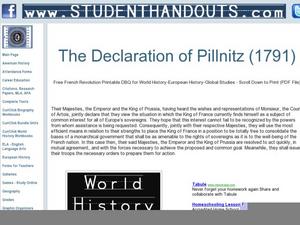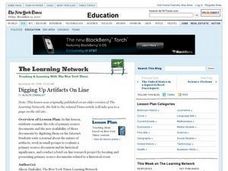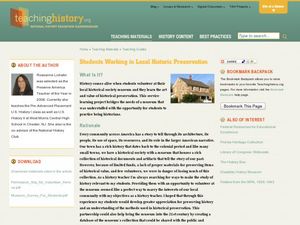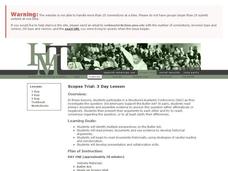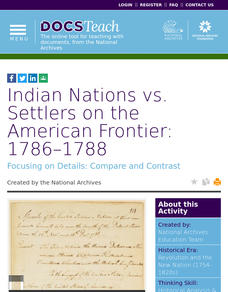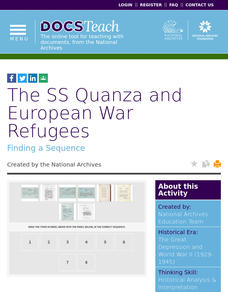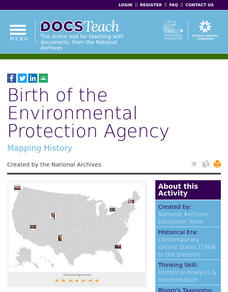Curated OER
The Declaration of Pillnitz (1791)
Primary source documents are wonderful because they provide a real context for historical events. Here is an expert from The Declaration of Pillnitz (1791) for your readers to examine. They consider the passage then use it to answer...
New York State Education Department
US History and Government Examination: January 2012
What led to the United States Civil War? Interested historians consider a variety of political, social, and economic factors using primary sources and an essay prompt in an authentic high-stakes test. Primary sources include political...
Barren County Schools
American Revolution Project
Here you will find three simple and engaging American Revolution projects that will allow your learners to not only express their comprehension of major events and key terms during the war, but also offer the opportunity for great...
Middle Level Learning
Philip Reid and the Statue of Freedom
Approach the concept of freedom in United States history from a variety of angles and delve into rich primary source analysis practice. Pupils study the Statue of Freedom, which sits atop the dome of the Capitol building in Washington...
Encyclopedia Britannica
Presidential Electability
There are specific constitutional requirements that candidates must meet to become president of the United States. In addition, there are societal opinions that affect a candidate's electability. Class members examine historical...
Curated OER
A Document-Based Essay on Korean Social Change
Students interpret historical evidence presented in primary resources. In this Korean history lesson, students examine the provided information on life in Korea. Students respond to the questions that accompany each source. Students then...
iCivics
DBQuest: The Nashville Sit-In Movement
What was it like to be a part of the sit-ins during the Civil Rights Movement? Learners consider the question and whether the protests were effective using an online documents-based investigation. The program allows for virtual...
Curated OER
Documents about the Boston Massacre and the Biases of Their Creators
Students compare and contrast writings about pre-American Revolution events. In this political agenda lesson, students conduct research to determine how bias and perspective have made their way into historical documents. Students examine...
Curated OER
Digging Up Artifacts On Line
Why is it important to preserve historical documents and artifacts? Examine the role of primary source documents and the availability of these documents on the Internet. Middle and high schoolers write a journal about the nature of...
Curated OER
The Two Sides of the Declaration of Independence
Budding historians read six documents related to grievances that led to the writing of the Declaration of Independence. They then craft an essay in which they discuss the perspective of both the colonists and the king. This DBQ could be...
Curated OER
The Movement Before the Movement: Civil Rights Activism in the 1940s
Many educators focus on the civil rights movement as it occurred after Rosa Parks incited the bus boycott. Extend the understanding of the fight for civil rights in the United States with this post-WWII lesson. Learners examine and...
Curated OER
HISTORICAL AND SOCIAL SCIENCES ANALYSIS
Students examine a variety of maps and documents to identify physical and cultural features of neighborhoods, cities, states, and countries, to explain the historical migration of people, expansion and disintegration of empires, and the...
Curated OER
Signature History
Young scholars review the meaning and application of primary and secondary sources in research. They determine how researchers locate primary source documents before looking at signatures as a validating factor on many primary sources....
Curated OER
Students Working in Local Historic Preservation
Students develop an appreciation of history as they volunteer their time in historical museums. In this historical perspectives lesson, students work with valuable local documents as they aid the staff of selected local historical museums.
Historical Thinking Matters
Scopes Trial: 1 Day Lesson
Why did many Tennesseeans support the 1925 Butler Act, which forbade the teaching of evolution? Using several primary source documents and a brief video clip, your young historians will draw connections between the broader historical...
Historical Thinking Matters
Scopes Trial: 3 Day Lesson
Was the Scopes trial more complicated than a simple debate between evolutionists and creationists? As part of a structured academic controversy (SAC) activity, pupils consider multiple perspectives of the Butler Act and engage in close...
DocsTeach
Senators' Pay in the First Congress
Senators are public servants but they do get paychecks. The activity focuses on historical analysis and a treasury document from the first Congress. Scholars read the document, answer questions, and participate in group discussion to...
DocsTeach
The School Lunch Program and the Federal Government
The school lunch program is rooted in the struggles of the Great Depression and is still assisting families today. Academics research documents and images relating to the creation of the school lunch program. Scholars use a worksheet to...
Annenberg Foundation
Analyzing Artifacts
If only a mask could talk! Using the interactive tool along with historical thinking skills, pupils uncover the meaning behind the various materials the resource presents. History becomes more relevant as the artifacts tell their stories...
DocsTeach
Alfred Sinker and the Writ of Habeas Corpus in 1861
Scholars learn how the judicial system treated under-age Civil War soldiers using historical analysis. The resource uses court documents to help historians understand why Habeas Corpus was used in the case of Alfred Sinker and why he was...
DocsTeach
Indian Nations vs. Settlers on the American Frontier: 1786–1788
Once Americans won the Revolutionary War, their quest to gain land did not end. An interesting activity focuses on Americans' expansion into the frontier following the war and how it conflicted with Native Americans living in the area....
DocsTeach
The SS Quanza and European War Refugees
World War II not only resulted in major loss of life, but it also displaced thousands of people. An eye-opening activity uses primary documents to explore the refugee crisis during World War II. Scholars compare the event to modern-day...
DocsTeach
Birth of the Environmental Protection Agency
Seeing is believing when it comes to climate change. An informative activity explores the creation of the Environmental Protection Agency (EPA) and its efforts to document environmental issues with photographs. Academics match images...
World History Digital Education Foundation, Inc.
COVID-19: Comparison with the Influenza Pandemic of 1918
A timely lesson uses documentation from the Spanish influenza pandemic of 1918 to compare it to the COVID-19 pandemic in 2020. Scholars watch a short video, analyze sources, complete a worksheet, and write a claim with supporting...


